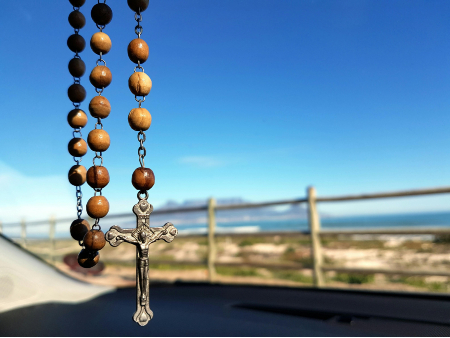We ask you, humbly: don't scroll away.
Hi readers, it seems you use Catholic Online a lot; that's great! It's a little awkward to ask, but we need your help. If you have already donated, we sincerely thank you. We're not salespeople, but we depend on donations averaging $14.76 and fewer than 1% of readers give. If you donate just $5.00, the price of your coffee, Catholic Online School could keep thriving. Thank you.Help Now >
TUESDAY HOMILY: Dough and Divine Development
FREE Catholic Classes
That tiny spoonful of what looks like powder seems like nothing, but without the yeast the flour, water, sugar and milk mixture remains a lump of hot, sticky goop. That seemingly ineffectual powder called yeast works it's way through the dough like magic.
Highlights
Catholic Online (https://www.catholic.org)
10/30/2012 (1 decade ago)
Published in Year of Faith
Keywords: faith, mustard seed, dough, yeast, parables of the kingdom, faith, Fr Dwight Longenecker
GREENVILLE, SC (Catholic Online) When you're loading up the bread maker for that delicious loaf of home made bread don't forget the yeast. That tiny spoonful of what looks like powder seems like nothing, but without the yeast the flour, water, sugar and milk mixture remains a lump of hot, sticky goop. That seemingly ineffectual powder called yeast works it's way through the dough like magic. It's the magic ingredient that transforms the dough into a fluffy white, wonderfully aromatic loaf.
In today's gospel Jesus likens the kingdom of God to the yeast and the dough. Like all parables, there are many levels of meaning. I'm going to start by going all theological and say that this points to the development of doctrine. Jesus didn't tell his disciples everything. He said his disciples could not understand everything during his time with them and promised that the Holy Spirit would come and "teach them all things."
Christ's teaching was like the spoonful of yeast that moves through the dough and expands to grow into a wholesome loaf. The finished loaf looks nothing like the spoonful of powdered yeast, but one comes from the other. Likewise, the Catholic doctrines may sometimes look strange compared to the simple life of Christ, but they have grown from the gospel as the yeast transforms the dough. The fifth century theologian Vincent of Lerins explained how doctrine develops in the church:
"The growth of religion in the soul must be analogous to the growth of the body, which, though in process of years it is developed and attains its full size, yet remains still the same....This, then, is undoubtedly the true and legitimate rule of progress, this the established and most beautiful order of growth, that mature age ever develops in the man those parts and forms which the wisdom of the Creator had already framed beforehand in the infant..In like manner...Christian doctrine follows the same laws of progress. It is consolidated by years, enlarged by time, refined by age, and yet is uncorrupted. It is complete and perfect."
So, for example, the dogma of the Immaculate Conception of the Blessed Virgin was defined in 1854, but the seed of this doctrine was planted way back in the garden of Eden. It developed as our understanding of the mystery of the Incarnation expanded and matured. From the virgin birth we came to understand her perpetual virginity and from this belief we came to understand the Immaculate Conception.
This is how the faith develops and grows through history, but this is also how the faith grows in our own lives. Spiritual life is gradual, natural and organic. As we grow and mature the faith grows and matures within us.
So often we want something dramatic and stupendous to happen in our spiritual lives. We look for a miracle. We want a great answer to prayer. We want that hallelujah moment. We want God to intervene and wave his magic wand and change us instantaneously and without too much effort. This is not the way it works.
Instead, true and lasting spiritual growth takes place gradually--even imperceptibly. The spirit grows in grace as the whole person grows and makes its pilgrimage through life. If this is true, then there are several precepts to remember.
First we must realize that the growth in grace is no more automatic than the growth of the seed into the tree. Remember Jesus' other parable about seeds. Some of them are taken away by birds. Some fall on stony ground. Some grow among weeds. The yeast doesn't always take. Sometimes the loaf falls flat and has to be thrown out. If we want to grow in grace; if we want the faith to develop in our lives, then we have to co-operate with grace and do everything we can to nurture our spiritual lives.
Secondly, we must be patient. Very often in the spiritual life God is doing something we can't see.
The seed grows underground to start with. The yeast is hidden in the dough--working away in an unseen way. Likewise, the Spirit is most often at work in our lives when we are not aware of it. God is present in the difficult times completing his work in us. The Holy Spirit often does his most effective work behind the scenes--in that moment of doubt and fear; in that time of grief and loss; in that series of trials that we think will unmake us. That is when God is busily at work making our faith and trust in him stronger than ever.
Finally, we must remember that the finished dough looks nothing like the powdered yeast. The great tree looks nothing like the little mustard seed. Likewise the final product of God's work within us is something far greater than we can imagine. As St Paul says in his letter to the Ephesians, God is working far greater things within us and for us than we can ever ask or think. He prays that we might be "strengthened with power through his Spirit in the inner self, and that Christ may dwell in your hearts through faith; that you, rooted and grounded in love, may have strength to comprehend with all the holy ones what is the breadth and length and height and depth, and to know the love of Christ that surpasses knowledge, so that you may be filled with all the fullness of God." This is not doctrinal development, but the development of the divine within us!
We ask you, humbly: don't scroll away.
Hi readers, it seems you use Catholic Online a lot; that's great! It's a little awkward to ask, but we need your help. If you have already donated, we sincerely thank you. We're not salespeople, but we depend on donations averaging $14.76 and fewer than 1% of readers give. If you donate just $5.00, the price of your coffee, Catholic Online School could keep thriving. Thank you.Help Now >
Here is the ultimate meaning of the gospel: that the Holy Spirit himself is the yeast and we are the dough, and as the dough is totally transformed, so we are to be totally transformed into Christ--who is, lest we forget it--also the Bread of Life.
---- ---
Fr Dwight Longenecker is the Parish Priest of Our Lady of the Rosary Church in Greenville, South Carolina. His latest book, Catholicism Pure and Simple. Visit his blog Standing on My Head and sign up for his free, weekly newsletter here.
'Help Give every Student and Teacher FREE resources for a world-class Moral Catholic Education'
Copyright 2021 - Distributed by Catholic Online
We ask you, humbly: don't scroll away.
Hi readers, it seems you use Catholic Online a lot; that's great! It's a little awkward to ask, but we need your help. If you have already donated, we sincerely thank you. We're not salespeople, but we depend on donations averaging $14.76 and fewer than 1% of readers give. If you donate just $5.00, the price of your coffee, Catholic Online School could keep thriving. Thank you.Help Now >








 Daily Readings for Wednesday, April 17, 2024
Daily Readings for Wednesday, April 17, 2024 St. Anicetus: Saint of the Day for Wednesday, April 17, 2024
St. Anicetus: Saint of the Day for Wednesday, April 17, 2024 Prayer to Love God above all Things: Prayer of the Day for Wednesday, April 17, 2024
Prayer to Love God above all Things: Prayer of the Day for Wednesday, April 17, 2024


